Welcome to part two of your library of picture worksheets. These cover grammar and vocabulary topics for students between B1-B2.
We’re adding to this library all of the time and so if you need a some pictures to teach a grammar or vocabulary point, drop us a line on Slack at #sharingmaterials and we’ll publish what you need here.
Each pdf worksheet comes with a set of short instructions to help you on your way.
For more role plays, check out these activities designed to practice practical situations
Not found what you’re looking for?
Then check out our list of worksheets for beginners to A2.
B1 grammar: Already and yet
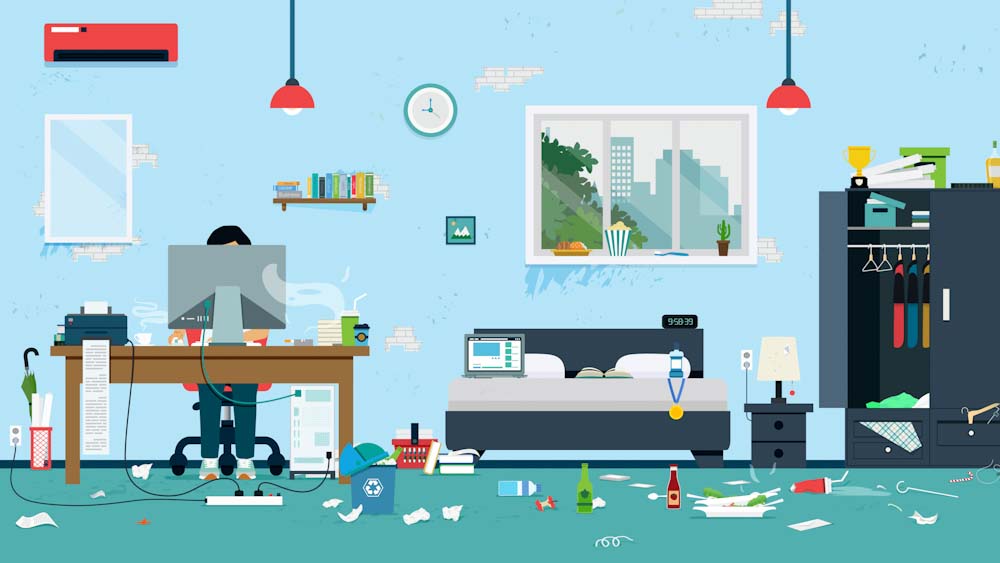
Practice ‘already’ and ‘yet’ with this picture worksheet of a freelancer’s office.
Instructions
To practice these adverbs with the present perfect, follow this method.
The tutor says a sentence in present tense. The student then changes that sentence to the present perfect and asks a question with ‘yet.’ Finally, the student answers their own question using ‘already‘ for positive or ‘yet‘ for negative.
For example:
Tutor: Print a document.
Student: Has the freelancer printed a document yet? Yes, they have already printed a document.
Suggested sentences include:
- Get dressed.
- Pick up bottles from the floor.
- Plug in the computer.
- Turn on the light.
- Tidy clothes in the closet.
- Make the bed.
- Pick up paper from the floor.
- Print a document.
- Shut down laptop.
- Vacuum the room.
Already and yet download
B1 grammar: Just and just about to
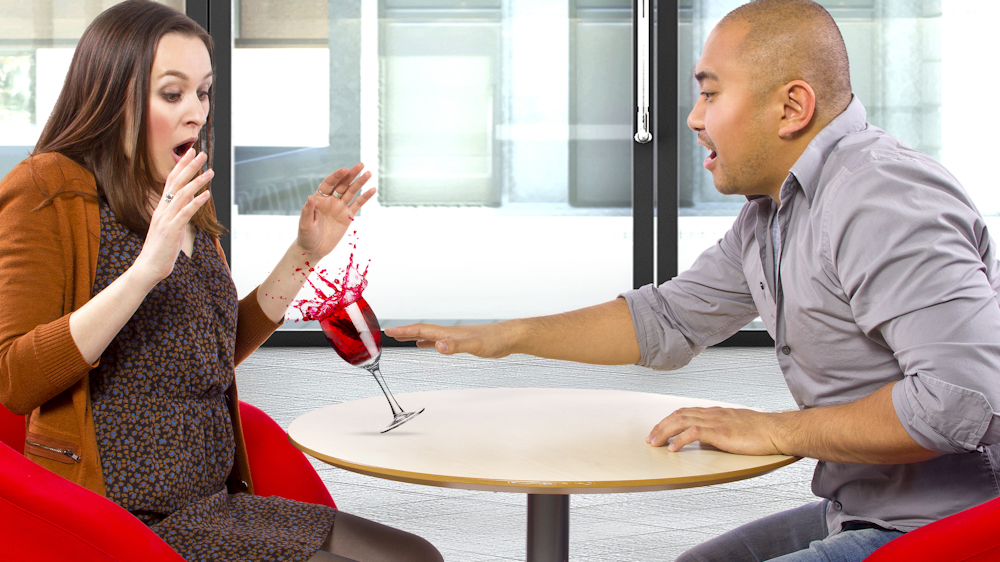
Practice the adverb ‘just‘ (structure: have + just + participle) to express recent past and the adverbial phrase just about + infinitive for immediate future, with this picture task.
Instructions
After teaching your student the structure of ‘just‘ and ‘just about’ + infinitive, practice the grammar by asking your student what has just happened in these photographs and what they think the people will do immediately after using ‘just about to.’
PDF download: Just and just about to
B1 grammar: Reflexive verbs and each other
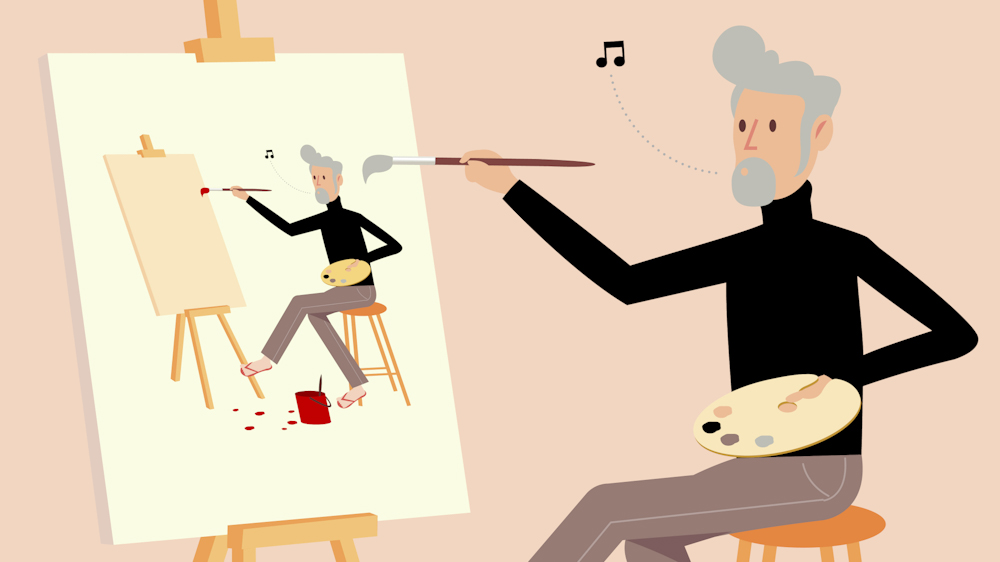
Practice reflexive pronouns ‘myself’, ‘yourself’, ‘himself’, ‘herself’, ‘ourselves’, ‘themselves’ and ‘each other’ with this picture worksheet.
Instructions
Once your student is familiar with reflexive pronouns and ‘each other’ ask them to tell you what is happening in each of these pictures.
Picture one: She is looking at herself, she is checking herself in the mirror.
Picture two: He has cut himself, he is treating himself.
Picture three: They are shouting at each other, they are angry with each other, they are looking at each other.
Picture four: They are hugging each other.
Picture five: He is painting himself, his is whistling to himself.
Picture six: They are training themselves. They are timing themselves (possibly).
Reflexive verbs download
B1 vocabulary: Landscapes and infrastructure

Instructions
Ask your student to describe these different scenes for you. There are four landscapes or scenes in total. Here are the suggested vocabulary for each one.
City: Harbour, bridge, skyscraper, streetlight, street light, roof top, stories of a building, floors in a building, sunset.
Country: Valley, meadow, mountain, hills, windy road, forest, clouds, farm house, picturesque.
Town: School, football pitch, running track, cross roads, zebra crossings, lake, fence, factory, chimney, harbour, church, fountain, field.
Street: Pavement, sidewalk, store, cyclist, market traders, to trade, food stall, spices, rugs, skyscrapers, walking stick, handbag, exhaust fumes.
Landscapes download
B2 grammar: Modal verbs for deduction and possibility
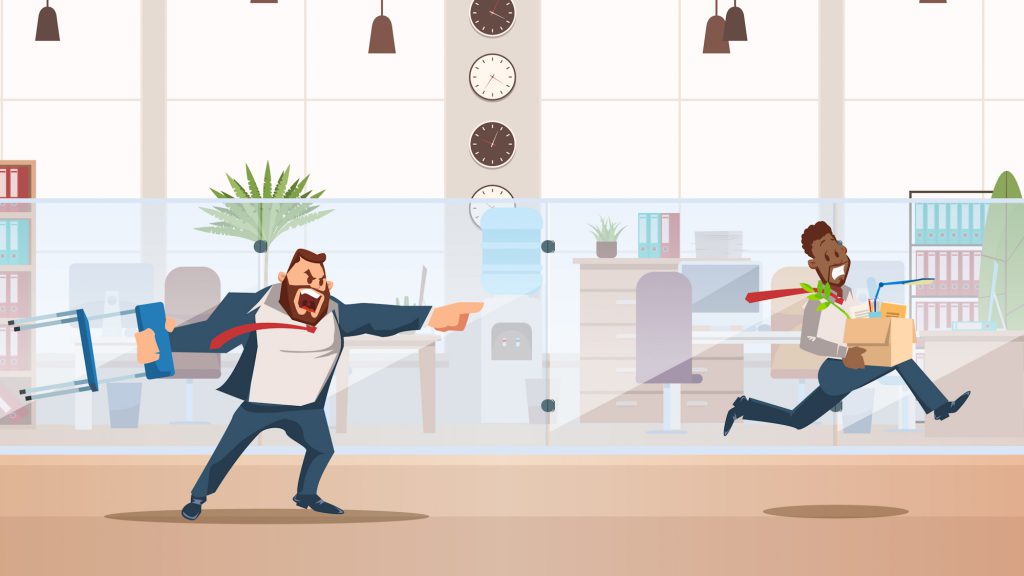
Practice ‘must’, ‘can’t’, ‘may’ and ‘might’ to express deduction and possibility with these pictures.
Instructions
The student looks at the picture and using modal verbs deduces what must be true in positive and negative (using ‘must’ and ‘can’t’) and what may or might be true in present tense.
For example, ‘the worker must be getting fired’. ‘The worker can’t be having a good day.’ ‘The guy holding the chair must be angry, he can’t be feeling relaxed.’ ‘The worker might be running towards the door’, ‘the worker might not have all of his stuff.’
In another lesson, when your student already has a very good understanding of modal verbs you can use this activity to practice modal verbs for deduction in past tense.
For example, ‘the worker might have messed something up,’ ‘the boss must have fired him’, ‘he can’t have had a good day.’
Possible deductions for each picture
Firing scene:
- Boss is angry, boss is not relaxed.
- Employee is scared, employee not having a good day.
- Employee is being fired, employee is being promoted.
- Employee is running out of the building,.
- Man with the box is an employee.
- Man with the chair is the boss.
Pickpocket:
- Man taking the wallet is a pickpocket, man taking the wallet is not the police.
- Man taking the wallet is a criminal.
- Man with the phone is not paying attention.
- Man with phone doesn’t know what’s happening, man with the phone does know what’s happening.
- Man with the phone is paying more attention to the person he is talking to.
- Man with the phone is a professional worker.
Flood scene:
- People in the boat are being rescued.
- The people in high visibility clothing are rescuing them.
- The houses are flooded, the houses are not dry inside.
- The cars are ruined, the cars don’t work fine.
- It is a dangerous situation, it is not a safe situation.
Rich man, poor man:
- The man on the left is poor, he is not rich.
- The man on the right has money, he is not poor.
- The man on the left is possibly homeless, he possibly doesn’t have a job.
- The man on the right possibly has a good job, he possibly has a big house and a nice car.
PDF download: Deductions and possibility
B2 grammar: Had better and would rather
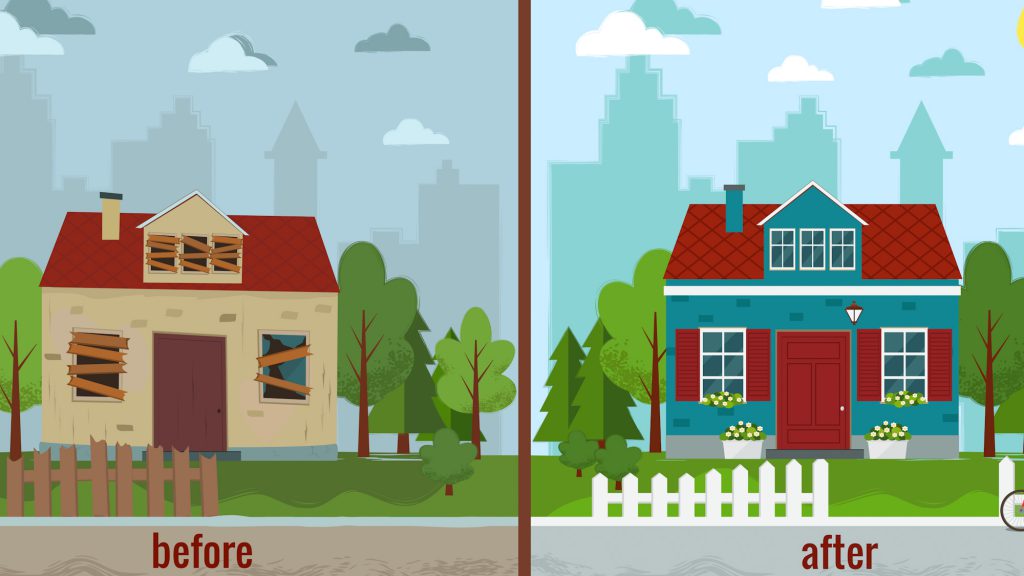
Practice ‘Had better’ + infinitive and ‘would rather’ + infinitive with this role play about house flipping.
Instructions
You’ve just bought a derelict house with your student which you would like to flip.
Using ‘had better’ and ‘would rather’ ask your student to decide which jobs they can do and which they have to leave for a professional. For example, ‘We had better fix the roof before it rains.’
Renovation budget (labour costs): $10,000
Labour costs for different jobs
- Fitting new windows: $2000
- Getting rid of rubbish: $400
- Fitting a new roof: $2000
- New drains: $800
- Fitting new floors: $1000
- Rebuilding garage: $1000
- Fitting new bathrooms: $2000
- Rewiring electricity $1000
- Fitting a new kitchen: $5000
- Building a new fireplace: $1000
- Gardening: $1000
- Fitting a new front door: $800
- Painting: $1000
- Fitting a security alarm $800
PDF download: House flipping
B2 vocabulary: Facial and body gestures

Practice different facial and body gestures with this worksheet.
Instructions
Ask your student to name each of these gestures from the photos.
Vocabulary: ‘To shrug your shoulders,’ ‘to give a shrug of the shoulders,’ ‘to wink,’ ‘a wink’, ‘to wave’, ‘a wave’, ‘to point at something’, ‘to shake hands’, ‘to yawn’, ‘a yawn.’
Next, ask your student to name some gestures that you do. These could include: ‘To nod’, ‘to shake your head’, ‘to blink’, ‘to roll your eyes’, ‘to frown’ , ‘to cross your arms.’
PDF download: Gestures
B2 speaking activity: Story prompts

Instructions
Ask your student to make up a story using one of these five pictures. Each picture tells a different story and so you can reuse this worksheet several times with one student.

